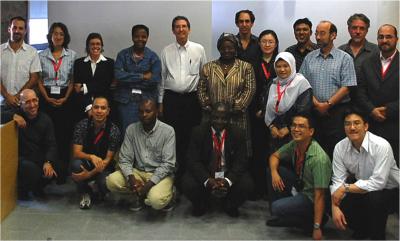 Amy Mahan
Amy Mahan
For twelve emerging scholars from developing countries around the world, their research ideas in the area of ICT for development have just been made reality. Having been chosen amongst numerous applications worldwide, the Amy Mahan Research Fellowship Program is now underway as the researchers begin planning out how their winning proposals will be implemented.
Principal Investigators of the research teams met at Universitat Pompeu Fabra (UPF), Barcelona on April 27 to undergo a 4-day research orientation workshop. This first step of the Amy Mahan Research Fellowship Program is the beginning of what will be a year of rigorous research activities for the fellows. The programme is part of a larger project known as Investigating the Social and Economic Impact of Public Access to ICT that also houses the Global Impact Study. Canada’s International Development Research Centre (IDRC) supports the programme while UPF manages its implementation.
The initiative was named after Amy Mahan, an Information and Communication Specialist who dedicated her life to improving the conditions of developing countries with a particular focus on the role of ICT. Sadly, Amy Mahan passed away after her battle with cancer while serving as a member of the Research Working Group of the Global Impact Study.
Frank Tulus, Senior Programme Officer at IDRC, explains that “the programme’s objective is two-fold: strengthening research capacity of emerging scholars from developing countries while at the same time increasing the availability of high-quality research coming from developing regions of the world.” The research teams will receive up to €22,000 and specialised mentoring guidance by international experts in the field of public access to ICT.
The twelve research teams (see below) are diverse and come from Asia, Africa, the Middle East, Latin America and the Caribbean. In line with the central objective of the programme, the teams will now begin to examine telecentres, cybercafés, libraries or other types of public access sites in order to understand the difference they are making in the lives of people around the world.
Nor Aziah, the Principal Investigator of the group selected from Malaysia, says that her team plans to “study political connectedness through the utilisation of government services via rural Internet centres.” Aziah also expressed that she is personally very honoured to have been chosen as an Amy Mahan Research Fellow as the programme “provides me with the opportunity to build my research capacity in an area close to my heart since I truly believe that technology is for the betterment of humankind and not to be accessed only by affluent communities or researched in state-of-the-art labs.”
Francisco Proenza, the Programme Manager, hosted the participants at UPF and finished his welcoming speech by paraphrasing a famous quote from the classic film Casablanca: “let this be the beginning of a beautiful and productive friendship.” In a moving speech on the last day of the workshop, Bruce Girard, Amy Mahan’s partner, conveyed to the participants his belief that Mahan would have been very pleased with the objective of the programme.
Armed with new knowledge for their research and having intensively worked on improving their proposals, the Principal Investigators of the Amy Mahan Research Fellows now return to their countries and will begin working with their teams to carry out their planned research. We are proud to have such a motivated and enthusiastic group to join the programme and we are certain that their contributions to the field will further demonstrate the impact of public access to ICT.
The following Principal Investigators and their teams were selected as Amy Mahan Research Fellows:
 Barcelona Workshop, April 27-30, 2010
Barcelona Workshop, April 27-30, 2010
Nor Aziah Alias
(Team based in Malaysia)
Rural Internet Centres (RICs) Patterns of Utilisation and its Impact on the Users’ Sense of Connectedness
Sebastián Benítez
(Team based in Argentina)
The Impact of Public Access to ICT on Lower Class Urban Youth in Argentina
Jorge Bossio
(Team based in Peru)
Impact of public Internet access on the strengthening of social organisation in the Peruvian Andes
Nikos Dacanay
(Team based in Thailand)
The Internet Shop/Centres: Empowering Women Migrant Workers and Refugees in Thailand
Jean Dammascene
(Team based in Rwanda)
Public access to IT skills and users’ job prospects
Alejandra Phillippi
(Team based in Chile)
Women and New Technologies in Chile: the Impact of community and public access on digital gender inclusion
Ghaleb Rabab’ah
(Team based in Jordan)
The Socio-economic Impact of Internet Cafés on the Jordanian Community
Wei Shang
(Team based in China)
Understanding Cybercafe Users’ Willingness to Pay in Mainland China
Balwant Singh Mehta
(Team based in India)
Nature and Impact of Shared Public Access to Internet – Towns and Rural Areas in Developing Countries: a case of cybercafés and telecentres in India
Sylvie Siyam
(Team based in Cameroon)
Multipurpose Community Telecentres: tools for improving universal access and change in rural Cameroon
Haroon Sseguya
(Team based in Uganda)
Influence of Network Roles on Public Access ICT Venue Capacities on Uganda
Simon Yalams
(Team based in Jamaica)
An Assessment of the Impact of Commercial Internet Centres (Cybercafés) on Users in Jamaica
Investigating the Social and Economic Impact of Public Access to ICT is a five-year, CAD$7.9 million research project supported by Canada’s International Development Research Centre (IDRC), and a grant to IDRC from the Bill & Melinda Gates Foundation. Managed by IDRC, it is executed through two sub-projects: the Global Impact Study, and the Amy Mahan Research Fellowship Program. The Global Impact Study, led by the Technology & Social Change Group at the University of Washington, funds a series of rigorous studies that aims to generate concrete evidence on the impact of public access to ICT. The Amy Mahan Research Fellowship, led by Universitat Pompeu Fabra, deepens the capacity of emerging scholars with the goal of increasing the amount of quality research in the area of public access to ICT from developing countries.